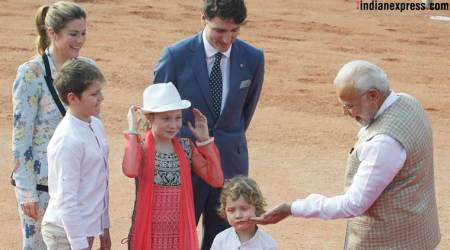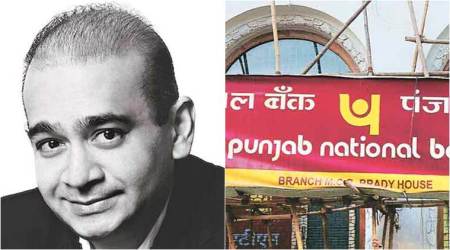 Ritu Sarin receives the IPI Award from Justice Lodha. (Praveen Khanna)
Ritu Sarin receives the IPI Award from Justice Lodha. (Praveen Khanna)
If the public feels that journalists have given up their role of a watchdog to become a guard dog for those in authority and power, it does not bode well for a democratic society, former Chief Justice of India Justice R M Lodha warned here Friday. He called on the media not to succumb to pressure or intimidation that could curtail “freedoms guaranteed by the Constitution.” Calling an independent judiciary and independent media the “heart and soul of Constitutional democracy,” Justice Lodha said that it’s only when these two pillars are strong that citizens feel empowered and their rights secured.
Justice Lodha, author of the roadmap for reforms in the cricket board, was speaking as Chief Guest after he presented the International Press Institute’s 2017 India Award for excellence in journalism to Ritu Sarin, Executive Editor (Investigations) of The Indian Express.
Sarin was unanimously chosen by the jury — chaired by jurist Soli Sorabjee — for her investigative stories exposing corruption over the years and for leading the team in the newspaper that probed the Panama Papers.
Established in 2003, the IPI Award celebrates excellence in journalism in the public interest — this is the fourth IPI award for The Indian Express and its journalists.
“Any perception that watchdog journalism is being replaced by guard-dog journalism is not good for democracy at all. Media should be critical all the time and should have the ability to preserve plurality of views,” said Justice Lodha. Citing Sarin’s work as “groundbreaking journalism,” he said that to serve the public’s right to know, journalists must sometimes act like “attack dogs” in their pursuit of exposing “unscrupulous public servants…unethical, immoral and illegal behaviour by government officials, politicians, institutions and private individuals.”
In a democracy, the former Chief Justice said, “when the press asks tough questions of those in authority, considers issues of public importance in different light and ensures that our country’s core values are upheld, everyone benefits.”
In 2013, Justice Lodha is credited with the phrase “caged parrot” for the CBI.
The recent instances of “hostility, threat and harassment on food choices, inter-religion marriages, creative art in the form of films and songs, transportation of cows”, Justice Lodha said, had a tendency to “crush the spirit of our constitutional freedoms.” That’s why it’s important for the media and society not to succumb to “pressures, harassment and intimidation.”
History has enough “cautionary tales,” Justice Lodha said, that when government limits the right of the citizens to talk about certain topics, “important conversations are pushed into the shadows”.
Justice Lodha also spoke about the reported rift among the members of the bench at the Supreme Court over the last few weeks. He said that although the justices at the Indian Supreme Court — as compared to the US Supreme Court — sit in division, not in unison, “the judiciary should not come across as a divided house”.
He said, “the faith of people in the judiciary (is) shaken when they see cracks in the highest court. This does not bode well for the public image of the judiciary. Public trust and respect for the highest court built over the years needs to be restored. Every Indian should feel our courts a safe place to seek protection and resolve the dispute.”
“As a place of integrity and independence, as a refuge for those in our society who seek to enforce rights and protect freedoms, the Supreme Court is the last hope,” he said. “Our freedoms depend on it.” The judiciary’s role becomes even more important and its independence critical “when there is challenge to the freedom guaranteed under the constitution”.
Quoting one of the authors of the American constitution Alexander Hamilton, he said “judiciary is in continual jeopardy of being overpowered, awed or influenced by the other organs of the state”. He mentioned that such influence can be “overt or subtle”, and the courts are “easy targets because judges individually cannot respond to these attacks”.
Earlier, Sorabjee, too, cautioned against rising intolerance. This, he said, smothers dissent and leads to “self-censorship.”
Philip Mathew, Fellow of IPI, who welcomed the dignitaries said press freedom was in peril when the IPI was instituted seven decades ago and it is even today. Pointing to rising intolerance of dissent, N. Ravi, chairman of IPI India, said that “religious, caste and linguistic groups taking offence at some perceived slight and resorting to legal action or, worse, to violent protests and attacks is not a new phenomenon but in recent times this tendency has taken on menacing proportions.”
Accepting the award, Sarin thanked The Indian Express chairman Viveck Goenka for nurturing a platform that believed and practised the best in investigative journalism. This award is an encouragement for the kind of work I have done for more than three decades, she said, and, in a reference to the citation that praised her career, said: “Career to abhi baaki hai.”
For all the latest India News, download Indian Express App
- Feb 24, 2018 at 8:26 amThe media has to become honest reporters before they become any kind of dogs. They have to give up allegiance or contempt to any political philosophy, cultural or relgious belief systems and segments ot the society. Contempt towards RSS and HIndu heritage and religious practices have been thir blind spot.Reply


























